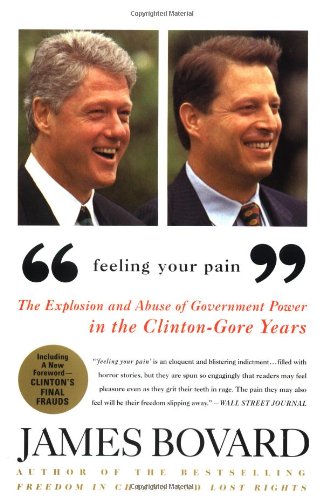Yesterday, on the fifteenth anniversary of the attack on the federal office building in Oklahoma City, former President Bill Clinton had an op-ed today in the New York Times headlined: “Violence is Unacceptable in a Democracy.” The article settles any doubts about whether Clinton was one of the most talented demagogues of modern times.
Casting a net of collective guilt over much of the 48 contiguous states, Clinton announced that the 1995 bombing was the fault of people who believed “that the greatest threat to American freedom is our government, and that public servants do not protect our freedoms, but abuse them.” People who distrusted government helped echo ideas which somehow persuaded “deeply alienated and disconnected Americans” to carry out the attack.
 Feeling Your Pain: The...
Best Price: $2.89
Buy New $11.10
(as of 12:25 UTC - Details)
Feeling Your Pain: The...
Best Price: $2.89
Buy New $11.10
(as of 12:25 UTC - Details)
In other words, people who harshly criticize the government are guilty of — or at least complicit in — mass murder.
It would be difficult to contrive a storyline to better exonerate all government actions. We still know far too little about the actual facts of the Oklahoma City bombing. We do know that the perpetrators were guilty of a heinous crime and deserved the harshest punishment. But that is a topic for a different day.
 Attention Deficit Demo...
Best Price: $1.38
Buy New $12.39
(as of 03:50 UTC - Details)
Attention Deficit Demo...
Best Price: $1.38
Buy New $12.39
(as of 03:50 UTC - Details)
Clinton declared that “we do not have the right to resort to violence — or the threat of violence — when we don’t get our way. “
Unless you’re the government.
The four million Americans arrested for marijuana violations during Clinton’s reign were victims of government violence and government threats of violence. The “fact” that Clinton never inhaled did not prevent the drug war from ravaging far more lives during his time in office. The number of people arrested for drug offenses rose by 73% between 1992 and 1997. The Clinton administration bankrolled the militarization of local police, sowing the seeds for a scourge of no-knock raids at wrong addresses and a massive increase in efforts to intimidate average citizens in big cities around the country.
During Clinton’s reign, the IRS seized over 12 million bank accounts, put liens on over 9 million people’s homes and land, directly confiscated more than 100,000 people’s houses, cars, or real property, and imposed over 100 million penalties on people for allegedly not paying sufficient taxes, paying taxes late, etc. The IRS knew that millions of citizens were assessed taxes and penalties that they did not owe. A 1997 audit of the IRS’s Arkansas-Oklahoma district found that a third of the property seizures carried out violated federal law or IRS regulations. Former IRS district chief David Patnoe observed in 1998: “More tax is collected by fear and intimidation than by the law.” The Clinton administration fought tooth and nail against a law Congress passed in 1998 to curtail IRS depredations against innocent Americans.
 Partners in Power: The...
Best Price: $0.25
Buy New $30.00
(as of 06:15 UTC - Details)
Partners in Power: The...
Best Price: $0.25
Buy New $30.00
(as of 06:15 UTC - Details)
Clinton’s op-ed mentions, almost as an aside, that the Oklahoma City bombing occurred on the second anniversary of the final assault at Waco. In 1995, Clinton denounced the Branch Davidians as “murderers” for their response to the 1993 Bureau of Alcohol Tobacco and Firearms attack on their home. Clinton used that label even though a Texas jury found no such guilt — and even though the BATF apparently shot first and did not have a proper warrant for its no-knock, military-style raid.
 Terrorism and Tyranny:...
Best Price: $3.78
Buy New $14.51
(as of 01:40 UTC - Details)
Terrorism and Tyranny:...
Best Price: $3.78
Buy New $14.51
(as of 01:40 UTC - Details)
Clinton was commander-in-chief when the FBI 54-ton tanks smashed into the Davidians’ home, collapsing 25% of the ramshackle building on top of residents before a fire commenced that left 80 people dead. His administration did almost everything it could to cover up the details of federal action at Waco, spurring the widespread distrust which Clinton later denounced.
The federal raid in April 2000 to seize six-year-old Elian Gonzalez was Clinton-style non-violence at its best. The late-night surprise attack went as planned — nabbing the boy and leaving shattered doors, a broken bed, roughed-up Cuban-Americans and two NBC cameramen on the ground, writhing in pain from stomach-kicks or rifle-butts to the head. But a photographer caught the image of a souped-up Border Patrol agent pointing his submachine gun toward the terrified boy.
Clinton administration officials rushed to explain why the raid was practically a demonstration of Gandhi’s teachings in action. A few hours after the raid, Deputy Attorney General Eric Holder asserted that the boy “was not taken at the point of a gun.” When challenged about the machine-gun photograph, Holder explained: “They were armed agents who went in there who acted very sensitively.” Attorney General Janet Reno stressed that the photo showed that agent’s “finger was not on the trigger.” Two days later, Reno declared, “One of the things that is so very important is that the force was not used. It was a show of force that prevented people from getting hurt.” By Reno’s standard, any bank robbery in which no one gets shot is merely a nonviolent exchange of bags of money. White House spokesman Joe Lockhart, responding to a question about the use of excessive force, stressed that the agents “drove up [to the Gonzalez house] in white mini-vans” — as if the vehicle’s color proved they were on a mission of mercy.





